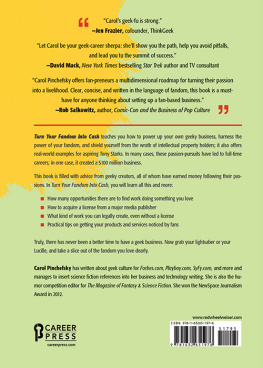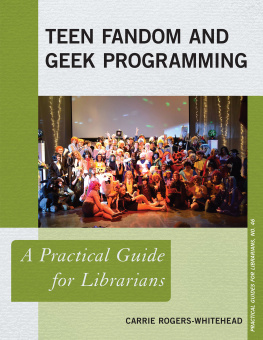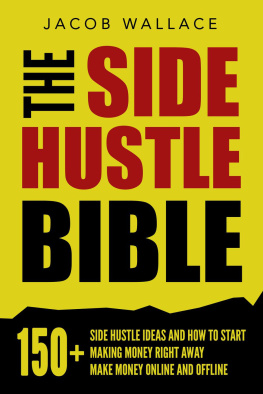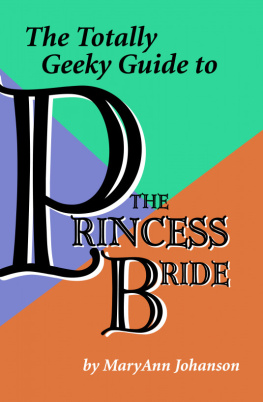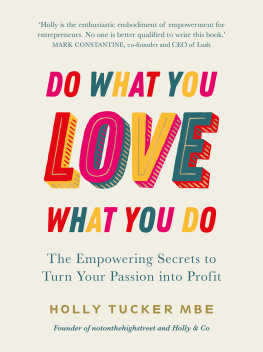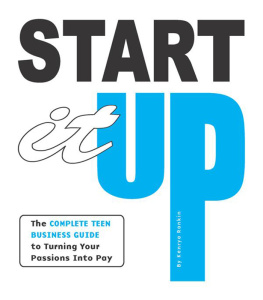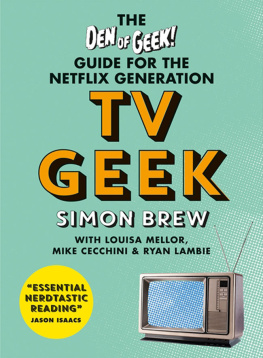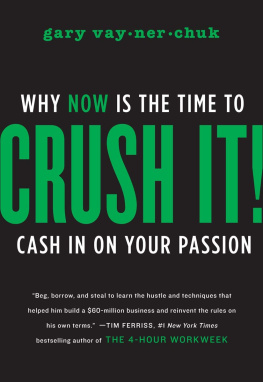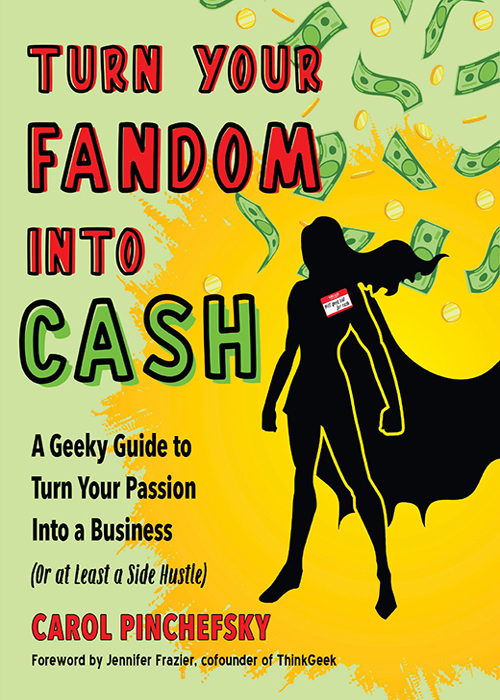

This edition first published in 2022 by Career Press, an imprint of
Red Wheel/Weiser, LLC
With offices at:
65 Parker Street, Suite 7
Newburyport, MA 01950
www.careerpress.com
www.redwheelweiser.com
www.redwheelweiser.com/newsletter
Copyright 2022 by Carol Pinchefsky
Foreword copyright 2022 by Jennifer Frazier
All rights reserved. No part of this publication may be reproduced or transmitted in any
form or by any means, electronic or mechanical, including photocopying, recording, or
by any information storage and retrieval system, without permission in writing from
Red Wheel/Weiser, LLC. Reviewers may quote brief passages.
ISBN: 978-1-63265-197-6
Library of Congress Cataloging-in-Publication Data available upon request.
Cover design by Kathryn Sky-Peck
Interior by Steve Amarillo/Urban Design LLC
Typeset in Adobe Minion Pro, Barlow, Gallicide, Comic Book, SF Comic Strip
Printed in the United States of America
IBI
10 9 8 7 6 5 4 3 2 1
For Peter, who finds what is lost
This book is a general guide on how to develop your fandom into a business and is not intended as a source of legal or financial advice. Please consult an appropriate legal, business, or financial professional for your specific needs.
Chapter1:YOU ALREADY HAVE WHAT IT
TAKES TO START A BUSINESS
Chapter2:YOUR FANDOM IS SOMEONE ELSE'S INTELLECTUAL
PROPERTY; DEAL WITH IT--LEGALLY
Thanks to:
Melissa Lee Shaw, for her sharp-eyed editorial expertise
Vicki Van Ausdall, for her steely-eyed death glare
Jennifer Vineyard, for encouraging me with her words
Heather Krasna, for encouraging me with her deeds
Viki Kelly, for encouraging me with her fists
Jennifer Keishin Armstrong, for sharing her outline
Beth Nicholson, for giving me the worlds greatest writing shirt
Mike Pasigan, for pointing me in the right direction
For last-minute edits:
Iris Sloman Huff, Nikki McGeary, Jennifer McGuire, Jim Nicholson, and Mark Singer
Thanks again to interviewees:
Sunshine Levy, Pacita Prasarn, Daniel Myers, Willow Volante, David Pea, Laura Rosado, Amy Ostrander, Stuart Sandler, Andy Looney, Kristin Looney, Quentin Weir, Meredith Rose, Rebecca Tushnet, Katherine Trendacosta, Matt Cox, Catherine Elhoffer, David Irwin, Jon Lunn, Katie DiGiacinto, Melinda Johnson, David Vetrovec, David Erwin, Jordan Den Ellis, Miriam Max Salzman, Danielle Reichman, Daniel Hodges, Joel Meadows, Reece Robbins, Troy Foreman, Oriana Leckert, Mike Schfer, Alexandra Erin, Jennifer Wilson, David Barr Kirtley, Chris McLennan, Daniel Delgado, Greg Topalian, Russell Nohelty, Spat Oktan, Scott Wolpow, Natali Heuss, Allan Rosenberg, Mike Zhang, Cindy Khoo, John Joseph Adams, Sonia Michaels, Paul Levitz, Jennifer Frazier, Emma Lambert, Ash Miller, Tiffani Daniel, Sarah Harman, Nelson De Castro, Glenn Hauman, Peter David, Paul Charles, Jim Yelton, and Paul Mounts
Special thanks to my agent Rita Rosenkranz and my editor Michael Pye. This book was written on a 60% Glorious Modular Mechanical Keyboard.
ThinkGeek was birthed in 1999, in the relatively early days of the internet, when you were more likely to have a 56k modem than a cell phone. My cofounders and I were running a dial-up internet service provider (ISP) at the time, and we were lucky enough to see the potential of celebrating fandoms by selling unique and funny merchandise. What started as programmer jokes on coffee mugs turned into a $100m+ publicly held company with lots of blood, sweat, tears; licenses with Lucasfilm, Disney, and Minecraft; and the occasional cease-and-desist (C&D) letter.
What you may not know is that the story of ThinkGeek had more twists and turns than a journey to Mordor. We sold the company early on. It went through more parent companies and board members than I can count, but we founders were lucky enough to stay on to run it for the first thirteen years of its life. Even with the support of a parent company, we had to figure out most of the details of running ThinkGeek on our own. (A parent company that sells computer hardware and software doesnt necessarily know how to sell actual cool stuff to nerds.) There wasnt a manual on how to run a geeky fandom-centered business back then. We made it up as we went along, and it was hard, but somehow we pulled it off.
Carol has managed to write the manual I wish wed had back in 1999, when being a geektrepreneur seemed like a fantasy. She has distilled knowledge from many successful (and less than successful) geeky endeavors into an easy-to-follow instructional guide to turning your geeky passion into a real moneymaking business. Carols geek-fu is strong, having written 2,000 articles about science, technology, and geek culture for SyFy.com, Geek & Sundry, PC Gamer, and even Battlestar Galactica magazine. Shes also written two live-action role-playing games and several trivia contests. You will want her on your geeky trivia team. So say we all.
While I cant promise youll experience the success (and ultimate sunsetting) that ThinkGeek had, if you have the passion and follow the advice and tips outlined in this book, you are well on your way to being a successful geektrepreneur.
Jen Frazier
ThinkGeek Cofounder
Fairfax, Virginia USA
2021
Do you want to make money doing what you love? And do you love geek culture, the world of your favorite TV shows, movies, videogames, comics, and books? Youve come to the right place. Speak, friend, and enter.
In these pages youll find tips and advice from geeky entrepreneurs (that is, geektrepreneurs). Many of them didnt know how to start a business until they actually did it. You can benefit from their experience.
Learn from award-winning documentary maker Troy Foreman!
Foreman shares what he learned by doing... and how he managed to get actor Lance Henriksen and producer Chris Carter into his production. [See p. 104.] Its one of the many examples in this book that shows geeks the breadth of opportunities in the geekosphere.
Learn from bracelet maker Miriam Max Salzman!
Salzmans string creations became a part of their favorite TV show. Salzmans experience is evidence that even the smallest of businesses have impact. [See p. 80.]
Learn from British gamers Jon Lunn and Oliver Hulme!
Lunn and Hulmes company Spidermind Games proves that some geeky jobs can be lucrative enough that you can quit your day job. Lunn and Hulme have earned over $1.1 million and counting from their game company... eventually. [See p. 28.] Lunn and Hulme will also teach you that real-world tales of geektrepreneurial experience include trials and tribulations (and if youre a
Next page
